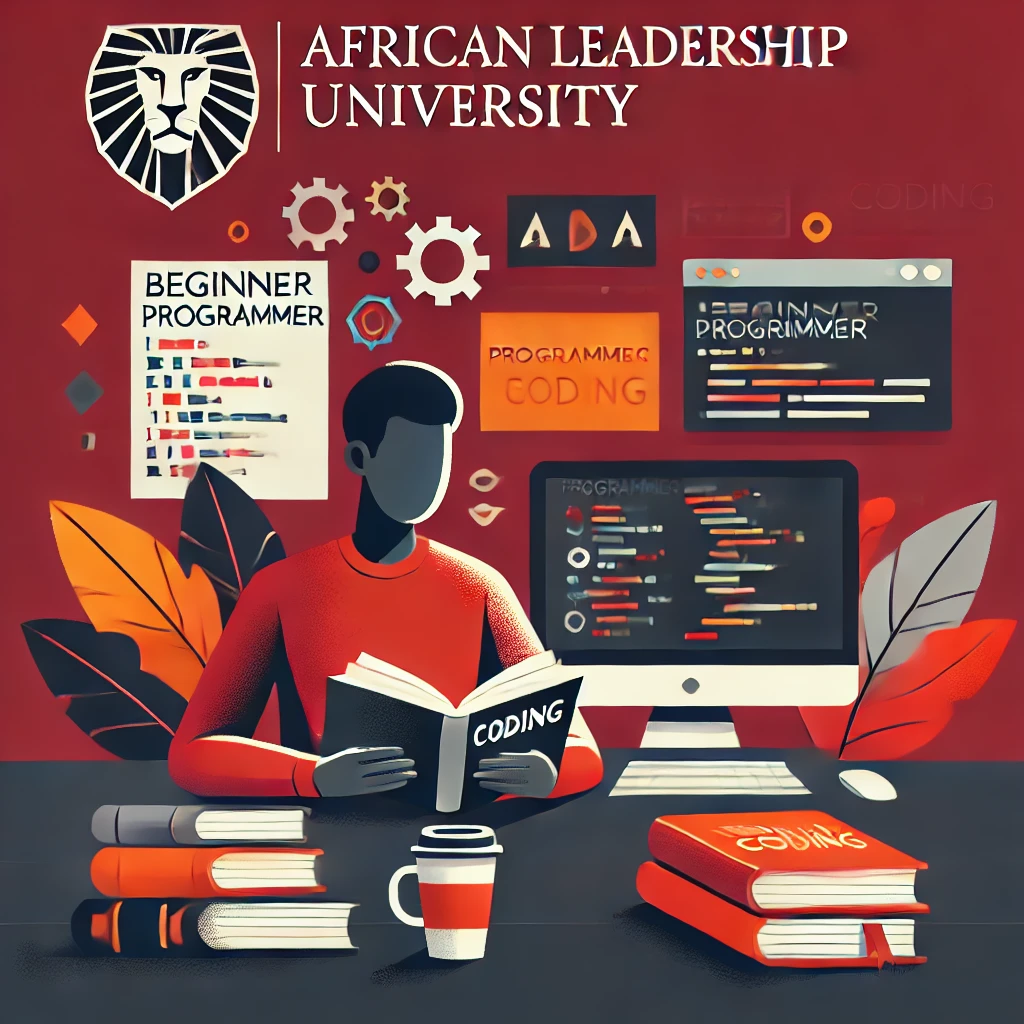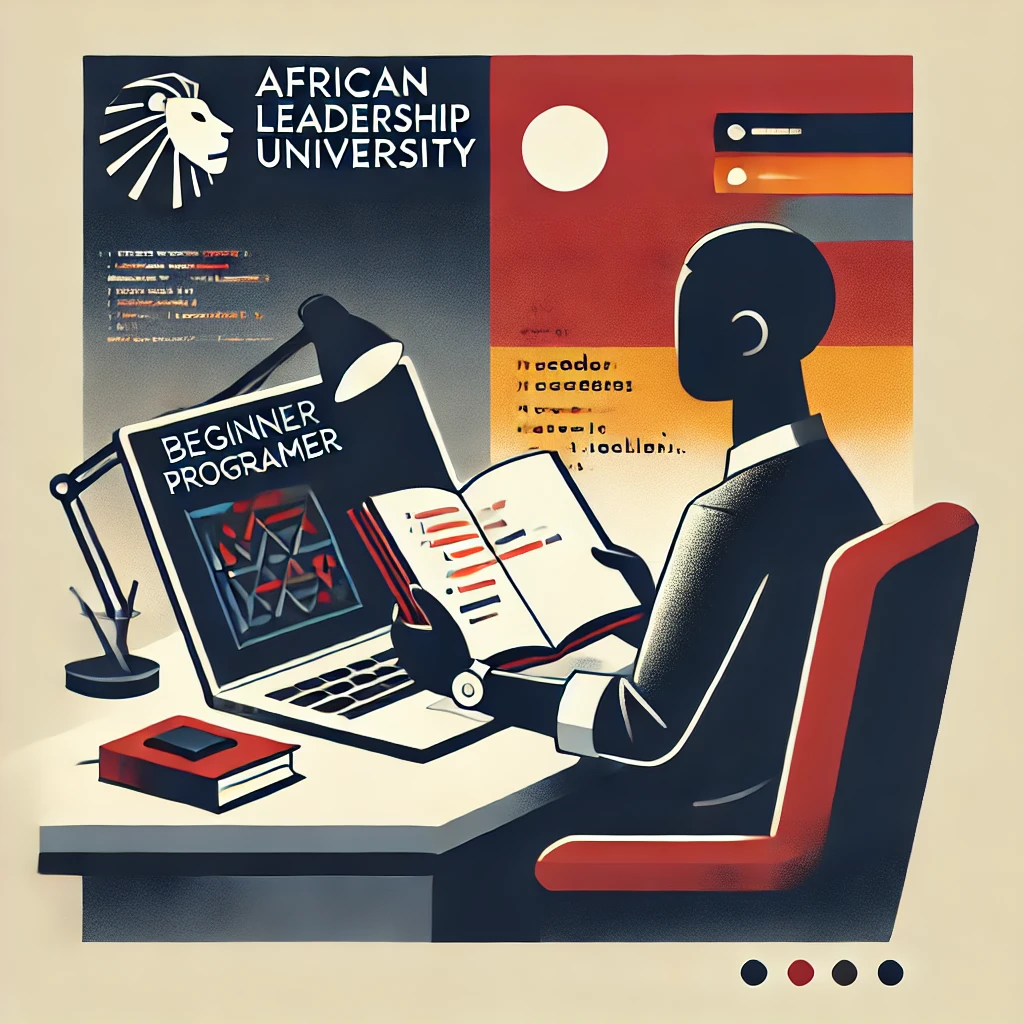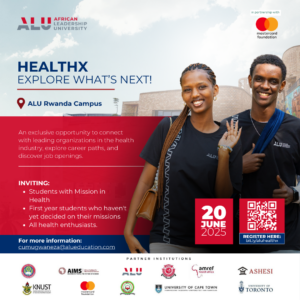Learning to code can be both exciting and overwhelming. With countless programming languages and resources available, choosing the right learning materials is crucial for success. While online tutorials, coding bootcamps, and interactive platforms dominate today’s learning landscape, programming books remain one of the most effective ways to build a strong programming foundation, offering structured content, expert insights, and deep conceptual understanding.
The African tech ecosystem is experiencing unprecedented growth, with cities like Lagos, Nairobi, Cape Town, Kigali and Accra emerging as major innovation hubs. Countries across the continent are investing heavily in digital transformation, creating massive opportunities for skilled programmers. From fintech solutions addressing financial inclusion to agricultural technology improving food security, African developers are building solutions that impact millions of lives.
At African Leadership University, we’ve witnessed firsthand how quality learning resources can transform aspiring developers into confident programmers who contribute meaningfully to Africa’s digital revolution. Programming books offer several unique advantages that make them particularly valuable for African learners: they don’t require constant internet connectivity, provide comprehensive coverage at an affordable cost, and allow for self-paced learning that accommodates various schedules and commitments.
This comprehensive guide highlights the best programming books for beginners in 2025, carefully curated to help you build strong fundamentals and advance systematically toward your programming goals. Whether you’re an aspiring web developer, data scientist, mobile app creator, or software engineer, these expertly selected resources will provide the structured foundation you need to succeed in today’s competitive tech landscape.
Why Programming Books Still Matter in 2025
Structured Learning Path
Unlike scattered online tutorials, programming books provide a logical progression from basic concepts to advanced topics. Authors spend months crafting each chapter to build upon previous knowledge, ensuring you develop a solid understanding before moving forward.
Deep Dive Into Concepts
Books allow for in-depth exploration of programming principles that quick online tutorials often skip. Understanding the “why” behind coding practices is crucial for becoming a skilled developer rather than just copying code snippets.
No Internet Distractions
Reading a physical or digital book helps maintain focus without the constant distractions of notifications, social media, or the temptation to jump between multiple resources.
Reference Material
Programming books serve as excellent reference materials throughout your career. You can easily revisit concepts, mark important sections, and use them as quick lookup guides during projects.
How to Choose the Right Programming Book
Before diving into the list, consider these factors when selecting a programming book:
- Programming Language: Choose a book based on the language you want to learn (Python, JavaScript, C, etc.).
- Learning Style: Some books focus on theory, while others provide hands-on projects.
- Skill Level: Beginners should start with books designed for absolute newcomers.
- Use Case: Are you learning for web development, data science, or software engineering?
Good Read: Abilities Needed to Be a Computer Programmer
Best Programming Books for Absolute Beginners
1. “Python Crash Course” by Eric Matthes
Best for: Complete programming beginners
Language: Python
Difficulty: Beginner to Intermediate
This book stands out as one of the most beginner-friendly programming books available. Matthes takes readers from zero programming knowledge to building real projects like games and web applications. The book is divided into two parts: fundamental programming concepts and practical projects.
What makes it special:
- Clear, conversational writing style
- Hands-on projects that reinforce learning
- Excellent error handling explanations
- Active online community and resources
Perfect for African students because: Python’s versatility makes it ideal for various industries growing across Africa, from fintech to agriculture technology.
2. “Eloquent JavaScript” – Marijn Haverbeke
- Why it’s great: A deep yet beginner-friendly dive into JavaScript fundamentals.
- Key topics: Functions, objects, error handling, asynchronous programming.
- Best for: Aspiring web developers.
- Haverbeke, M. (2018). Eloquent JavaScript.
3. “Automate the Boring Stuff with Python” by Al Sweigart
Best for: Beginners who want immediate practical applications
Language: Python
Difficulty: Beginner
This book focuses on using Python to automate everyday tasks, making it perfect for beginners who want to see immediate practical benefits from their programming skills. It covers web scraping, email automation, file management, and more.
Key strengths:
- Practical, real-world examples
- No prior programming experience required
- Free online version available
- Focuses on useful automation tasks
4. “Head First Java” by Kathy Sierra and Bert Bates
Best for: Visual learners and beginners interested in enterprise development
Language: Java
Difficulty: Beginner to Intermediate
The Head First series is renowned for its unique, engaging approach to teaching complex topics. This Java book uses humor, puzzles, and visual learning techniques to make object-oriented programming concepts accessible to beginners.
Why it works:
- Visual learning approach with diagrams and illustrations
- Engaging, conversational tone
- Covers object-oriented programming thoroughly
- Strong foundation for enterprise development
Relevance for Africa: Java remains crucial for enterprise applications and Android development, both growing rapidly across African markets.
5. “JavaScript: The Good Parts” by Douglas Crockford
Best for: Beginners focusing on web development
Language: JavaScript
Difficulty: Beginner to Intermediate
While JavaScript has evolved significantly since this book’s publication, Crockford’s insights into the language’s core features remain invaluable. This concise book helps beginners understand JavaScript’s strengths and avoid common pitfalls.
Key benefits:
- Concise and focused approach
- Explains JavaScript’s unique features
- Helps avoid common beginner mistakes
- Foundation for modern web development
6. “C Programming Language” by Brian Kernighan and Dennis Ritchie
Best for: Beginners who want to understand programming fundamentals deeply
Language: C
Difficulty: Intermediate
Often called “K&R C,” this classic book was written by C’s creators. While more challenging than other beginner books, it provides an unparalleled understanding of programming fundamentals and system-level thinking.
Why include it:
- Teaches fundamental programming concepts
- Builds strong problem-solving skills
- Foundation for understanding other languages
- Develops efficient coding practices
Best Programming Books for Computer Science Foundations

7. The Pragmatic Programmer – Andrew Hunt & David Thomas
- Why it’s great: Covers coding best practices and problem-solving strategies.
- Key topics: Debugging, software design, automation, team collaboration.
- Best for: Beginners and intermediate developers.
8. Structure and Interpretation of Computer Programs (SICP)
- Why it’s great: Introduces fundamental computer science concepts.
- Key topics: Functional programming, algorithms, abstraction.
- Best for: Those wanting a deeper theoretical understanding.
9. Clean Code – Robert C. Martin
- Why it’s great: Teaches how to write readable and maintainable code.
- Key topics: Code structure, naming conventions, refactoring.
- Best for: Anyone aiming to write professional-quality code.
Recommended Post: What Does a Computer Software Engineer Do?
Best Books for Learning Web Development
10. HTML & CSS: Design and Build Websites – Jon Duckett
- Why it’s great: A visually engaging book for learning web design.
- Key topics: HTML, CSS, responsive design.
- Best for: Beginners in front-end development.
11. JavaScript and JQuery: Interactive Front-End Development – Jon Duckett
- Why it’s great: Simplifies JavaScript concepts with visual learning.
- Key topics: DOM manipulation, animations, AJAX.
- Best for: Visual learners.
12. You Don’t Know JS – Kyle Simpson
- Why it’s great: Provides an in-depth understanding of JavaScript.
- Key topics: Closures, scope, async programming.
- Best for: Those wanting to master JavaScript.
Best Books for Data Science & Machine Learning
13. Hands-On Machine Learning with Scikit-Learn, Keras, and TensorFlow – Aurélien Géron
- Why it’s great: Practical, hands-on approach to machine learning.
- Key topics: Supervised learning, deep learning, neural networks.
- Best for: Beginners in AI and ML.
14. Python for Data Analysis – Wes McKinney
- Why it’s great: Teaches data manipulation and analysis.
- Key topics: Pandas, NumPy, data visualization.
- Best for: Aspiring data analysts.
Suggested Post: What Are Subfields in Software Engineering?
Best Free Programming Books
- Think Python by Allen B. Downey – Available for free online.
- Learn Python the Hard Way by Zed Shaw – Offers a structured learning path.
How to Choose the Right Programming Book for Your Journey
Selecting the perfect programming book can make the difference between frustration and breakthrough moments in your coding journey. Here’s a comprehensive framework to guide your decision:
1. Consider Your Learning Style and Preferences
Visual Learners should prioritize books with:
- Abundant diagrams, flowcharts, and code visualization
- Color-coded syntax examples and step-by-step illustrations
- Mind maps and concept relationships clearly displayed
- Before-and-after code comparisons showing improvements
Hands-On Learners benefit most from books featuring:
- Numerous practical exercises and coding challenges
- Real-world projects that build throughout the book
- Interactive elements and “try this now” sections
- GitHub repositories with downloadable starter code
Theory-Focused Learners should seek books that:
- Explain the “why” behind programming concepts and decisions
- Provide historical context for language design choices
- Include mathematical foundations and algorithmic thinking
- Connect programming concepts to broader computer science principles
2. Align Books with Your Specific Career Goals
For Career Changers:
Choose comprehensive books that cover industry-relevant skills, include portfolio project ideas, and address professional development practices. Look for books that bridge the gap between learning syntax and building production-ready applications.
For Academic Learners:
Select books that complement your curriculum, provide theoretical depth, and include exercises suitable for coursework. Consider books used in top computer science programs globally.
For Hobby Programmers:
Focus on books that emphasize fun, creative projects and provide immediate gratification. Look for books that help you build games, automation tools, or personal websites quickly.
For Entrepreneurs:
Prioritize books that teach full-stack development, rapid prototyping, and technologies commonly used in startups. Consider books that cover both technical skills and the business side of software development.
3. Evaluate Book Currency and Relevance
Programming languages and frameworks evolve rapidly, making book currency crucial:
For Web Technologies:
Ensure books cover current versions and modern best practices. Look for publications from the last 1-2 years, as web technologies change frequently.
For Core Programming Languages:
Books on languages like Python, Java, or C can remain relevant for 3-5 years, but newer editions often include updated examples and modern practices.
For Emerging Technologies:
For topics like AI/ML, cloud computing, or mobile development, prioritize books published within the last 2 years to ensure relevance.
4. Research Reviews and Community Feedback
Check Multiple Sources:
- Amazon and Goodreads for general reader feedback
- Programming-specific forums like Stack Overflow and Reddit
- Developer blogs and coding bootcamp recommendations
- University reading lists and professional course materials
Look for Specific Feedback:
- Comments from beginners with similar backgrounds
- Mentions of clear explanations vs. confusing sections
- Reports on exercise quality and practical applicability
- Notes about prerequisite knowledge requirements
5. Consider Your Available Time and Commitment Level
Intensive Learners (20+ hours/week): Can handle comprehensive, dense books like “Structure and Interpretation of Computer Programs” or multi-book series.
Moderate Learners (10-15 hours/week): Should choose well-structured books with clear chapter divisions and milestone projects, like “Python Crash Course.”
Casual Learners (5-10 hours/week): Benefit from books with short, digestible chapters and frequent review sections, such as “Head First” series books.
6. Factor in Complementary Resources
The best programming books work well with supplementary materials:
- Books with active online communities and forums
- Authors who provide additional resources, videos, or updates
- Books that reference specific online practice platforms
- Resources that connect to real-world projects and portfolios
Effective Study Strategies for Programming Books
1. Code Along Actively
Don’t just read code examples—type them out. This muscle memory helps reinforce learning and helps you catch typos and understand error messages.
2. Start Projects Early
Begin working on personal projects as soon as you understand basic concepts. Apply what you’re learning to solve problems that interest you.
3. Join Study Groups
Connect with other learners through online communities, local meetups, or study groups. Discussing concepts with peers reinforces understanding.
4. Take Breaks and Review
Programming concepts need time to sink in. Take regular breaks and periodically review previous chapters to reinforce learning.
5. Practice Problem-Solving
Supplement book learning with coding challenges on platforms like HackerRank, LeetCode, or Codewars.
Building Your Programming Library
Start With One Book
Resist the urge to buy multiple programming books immediately. Master one book thoroughly before moving to the next.
Create a Learning Sequence
Plan your learning path:
- Foundation book (like Python Crash Course)
- Specialization book (web development, data science, etc.)
- Advanced concepts (algorithms, design patterns)
- Technology-specific books (frameworks, tools)
Balance Theory and Practice
Combine foundational books with practical project-based resources. Theory provides understanding; practice builds skills.
Common Mistakes When Learning from Programming Books
1. The Passive Reading Trap
The Mistake: Many beginners treat programming books like novels, reading through code examples without actually typing and running them.
Why It Happens: Reading feels like progress, and typing code seems slow and tedious compared to consuming information quickly.
The Solution:
- Mandatory Coding Rule: Never read a code example without typing it yourself
- Environment Setup: Have your development environment ready before starting each study session
- Error Embracement: When code doesn’t work as expected, treat it as a valuable learning opportunity
- Modification Practice: After getting examples to work, try changing them to see what happens
Real Impact: Students who code along retain 300% more information and develop practical skills much faster than passive readers.
2. The Exercise Skipping Syndrome
The Mistake: Rushing through book content while skipping exercises, thinking “I understand the concept, so I don’t need to practice.”
The Hidden Danger: Exercises are carefully designed to reveal knowledge gaps and reinforce learning through application. Skipping them creates false confidence that crumbles when facing real programming challenges.
Strategic Approach:
- Exercise First Policy: Read the exercise before the chapter to understand what you’re working toward
- Difficulty Progression: Start with easier exercises to build confidence, then tackle challenging ones
- Solution Analysis: After completing exercises, study official solutions to learn alternative approaches
- Extension Challenges: Create additional variations of exercises to deepen understanding
3. The Perfectionism Paralysis Problem
The Mistake: Believing you must understand every concept perfectly before moving to the next chapter or topic.
Why It Backfires: Programming concepts often build on each other, and some things only make sense after exposure to later material. Perfectionism creates artificial barriers to progress.
Healthy Learning Mindset:
- Comfort with Ambiguity: Accept that confusion is temporary and normal in learning complex topics
- Spiral Learning: Revisit difficult concepts after gaining more experience rather than getting stuck
- Progress Metrics: Measure progress by projects completed and problems solved, not perfect understanding
- Growth Documentation: Keep notes on concepts that initially confused you but later became clear
4. The Isolation Learning Error
The Mistake: Attempting to learn programming entirely alone without seeking help, feedback, or community interaction.
Missing Opportunities: Programming is inherently collaborative, and learning in isolation misses crucial aspects of real-world development: code reviews, debugging help, alternative perspectives, and professional networking.
Community Integration Strategies:
- Question Asking: Learn to ask clear, specific questions when stuck rather than struggling indefinitely
- Code Sharing: Share your work on platforms like GitHub to get feedback and demonstrate progress
- Peer Learning: Form study groups with other learners at similar levels for mutual support
- Mentorship Seeking: Connect with experienced developers who can provide guidance and career advice
5. The Tool Obsession Distraction
The Mistake: Spending excessive time researching and switching between development tools, editors, and frameworks instead of focusing on fundamental programming concepts.
The Reality Check: Professional developers often use whatever tools their team uses, and strong fundamentals matter more than perfect tool selection.
Focused Learning Approach:
- Good Enough Tools: Choose one decent development environment and stick with it throughout your learning journey
- Fundamentals First: Master programming concepts before worrying about advanced tooling and optimization
- Tool Learning Integration: Learn new tools only when they solve specific problems you’re facing
- Professional Context: Understand that workplace tool selection often depends on team decisions, not personal preferences
Conclusion
Choosing the right programming books is a crucial first step in your development journey. Whether you’re interested in web development, mobile apps, data science, or any other programming field, quality books provide the structured foundation you need to succeed.
Remember that learning programming is a marathon, not a sprint. Be patient with yourself, practice consistently, and don’t hesitate to seek help when needed. The African tech ecosystem needs skilled developers who understand both global best practices and local challenges.
At African Leadership University, we’re committed to developing Africa’s next generation of tech leaders. Combine the structured learning from these excellent programming books with hands-on projects, community involvement, and continuous practice. Your programming journey starts with turning the first page—begin today.
Have a favorite programming book? Let us know in the comments!






